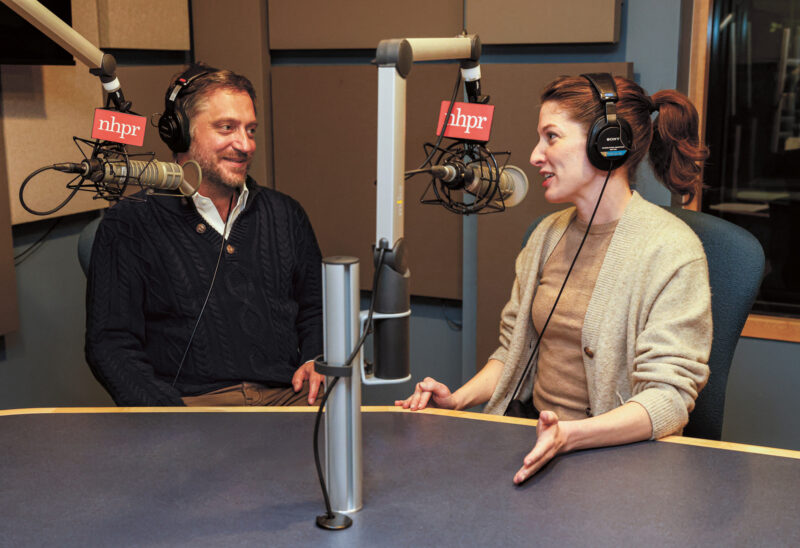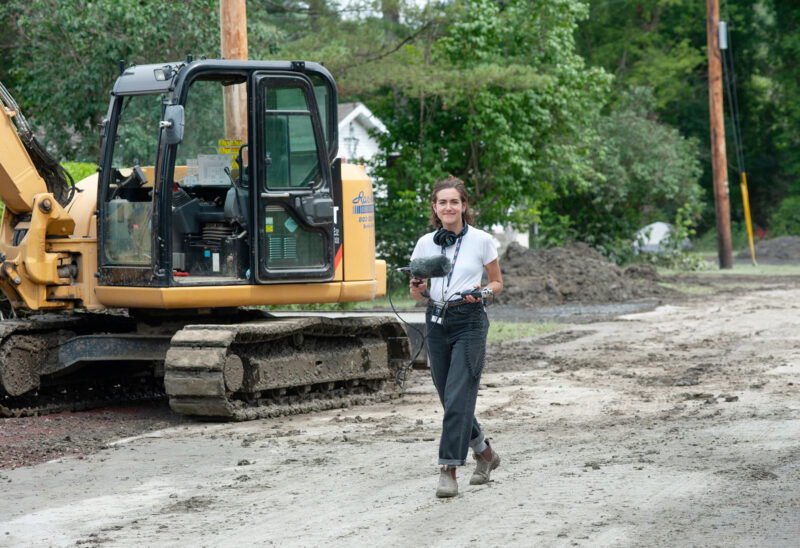In the confusing and frightening early days of Covid, some things became startlingly clear. Among them: Society cannot function without child care. The doctors and nurses and truckers and grocery workers and scientists we all relied on for survival had to have child care in order to keep doing their essential work.
Child care had a moment. Centers were granted emergency permission to stay open. Workers were applauded.
America, as it turns out, runs on child care.
Fast-forward four years. Despite pandemic-era aid, some centers across the state have closed. Longtime early-childhood professionals have retired. The median wage for a professional in early childhood care and education in New Hampshire remains about $15.50 an hour — without retirement or health benefits. You can make more stocking shelves. The state is short some 7,000 child care slots, and families face long wait lists. And cost remains a serious barrier. A New Hampshire family with an infant and a four-year-old in center-based care pays an average of $28,340 for child care — or 20 percent of the state’s median family income for a married couple.
People are opting out of paid work because they cannot find or afford care. Between November of 2022 and October of 2023, according to the New Hampshire Fiscal Policy Institute, approximately 16,000 Granite Staters were not in the workforce each month because they were caring for a child who was not in school or child care.
As Sen. Jeanne Shaheen said recently, “the repercussions of the child care crisis are being felt across every sector of our economy.”
That crisis is, in fact, acute. What is also true is that some progress has been made — and that New Hampshire nonprofits are working on innovations, collaborations and solutions from the policy level to the paycheck level.
“Child care has always been an important foundation for our families, economy and communities,” said Christina D’Allesandro, who focuses on early childhood and family supports at the Charitable Foundation. “Fortunately, more people than ever are recognizing that, and we have seen some important policy change and really promising strategies taking hold around the state.”
Investments, policy change
Spurred, in part, by grassroots and nonprofit advocates, the state included a one-time infusion of $15 million in the most recent budget for workforce development in the child care sector. Millions in federal American Rescue Plan dollars also kept centers open through the most dire stages of the pandemic. Advocates are pushing for additional federal and state investment to help keep centers open, make child care affordable and pay workers a living wage.
The state has expanded eligibility for child care scholarships — so that more families can get help paying for care, starting this year. This change has the potential to significantly reduce the cost of care for many families. The state has also increased the dollar amount reimbursed to centers for the care they provide to families who receive aid.
Cora-Lynn Hoppe, who runs the Rochester Child Care Center, said the expanded scholarship eligibility and reimbursement has taken some pressure off families, helped reduce stigma associated with applying for aid and allowed her to plan and forecast budgets more effectively.
“Every child deserves quality care,” Hoppe said. “This makes it that much better to live in this state.”
Those policy measures, however, are only first steps toward sustainability for the sector.
“It’s all super positive,” D’Allesandro said, “but it’s not enough.”
The nonprofit, nonpartisan New Hampshire Fiscal Policy Institute, with support from the Couch Family Foundation, now has a senior policy analyst focused in part on the issue of child care — part of the reason that such solid data exists to help understand the issue.
The New Hampshire Association for the Education of Young Children has been re-constituted to promote high-quality and affordable early care and education.
Investing in child care, said Nicole Heller, senior policy analyst at the Fiscal Policy Institute, “ultimately comes back to benefit the state and the economy. High-quality early childhood care and education helps kids get ready for school, with math, pre-reading and socio-emotional skills. For children, these early investments can mean greater educational attainment, higher earnings, lower rates of engagement with the criminal-justice system and a lower likelihood of needing subsidies as adults.”
Bridging the affordability gap
The actual cost of providing child care is more than most families can afford. From staffing to facilities, training, accreditation and supplies and utilities, centers are expensive to run — and must maintain strict student-to-teacher ratios.
“No one is getting rich in child care despite the fact that it is so expensive,” said Heller. “Breaking even is often the best-case scenario for providers.”
In the North Country, a child care affordability and sustainability pilot is underway, helping centers to recruit and retain staff while helping families to afford high-quality care.
The Lancaster Play and Learn Center is the only center-based care option for infants and toddlers for miles. Right now, the center has enough staff to accommodate 29 kids, though its capacity is 45. Another 53 children are on a wait list.
On a recent day, the children of police officers, utility workers, healthcare workers, bankers, factory workers and more settled in for lunch after some outdoor time, cared for by a cadre of educated professionals in this licensed facility. (Of those eight professional teachers, six have two jobs — tending bar and waitressing nights and weekends to make ends meet. Some still qualify for aid for food and health insurance.)
The Play and Learn is one of the centers participating in the Child Care Sustainability and Affordability Pilot program, funded by the Foundation and its Neil and Louise Tillotson Fund.
Under the program, centers are able set their tuition rates for all children to be closer to the state’s maximum reimbursement for those who receive scholarships. (Many centers do not do so already in an effort to keep costs down for families.) The program encourages all eligible families to apply for child care scholarships. And the funding helps bridge the gap so that families who are not eligible for scholarships do not see a tuition increase, but centers receive a higher level of reimbursement from the state for children who are eligible for scholarships. That means more money per child comes into centers. As a result of the pilot, teachers at the Play and Learn have received a modest wage increase — and the much-needed benefit of child care at the center for their own children.
Now, an associate teacher here with 10 years’ experience is making $16/hr., and a lead teacher got a fifty-cent per hour raise, to $19.25.
Caitlyn Bacon is the director of the Play and Learn — and also a former student here. She wishes she could pay staff more, but the pilot and expanded scholarship eligibility means “it’s better than it was a few months ago…it has helped retain staff and helped families be able to afford to send children to child care.”
The “Affordability Fund” that is making the pilot possible was seeded by the Charitable Foundation. The Coös Director Network of child care providers and the Coös Coalition for Children and Young Families are making a pitch to North Country businesses to contribute to sustain the fund over time.
Efforts to increase home-based care
Around the state, people are putting creativity and collaboration to work on local solutions with wider implications.
In Nashua, where the shortage of child care slots is particularly acute, two nonprofits have teamed up to help. The Community Engagement Training Center and the United Way of Greater Nashua are working with a group of Spanish-speaking residents who want to open home-based centers. Participants work through all the steps to become licensed by the state to provide home-based care, plus get business training, CPR and first-aid certification.
Berenice Martinez had so much trouble finding care for her own kids, now 8 and 10, that she left her job in advanced manufacturing to care for them. Now, she plans to open a home-based center so other parents can work.
“I can help my community and be home with my kids when they need me,” she said. “I have four neighbors in my own neighborhood that need child care — two of them don’t work because they don’t have child care.”
A similar project, spearheaded by a coalition of nonprofits and municipal officials, is underway to create more home-based child care in the Monadnock region. Both efforts show promise for replication elsewhere.
Promising solutions around the country
Effective solutions have been implemented elsewhere in the U.S., Heller said. Maine and Washington, D.C., have instituted stipend programs for the child care workforce. New Mexico provides child care subsidies so that every family at or below 400 percent of the federal poverty level gets free child care. And more.
“Clearly, there are solutions to this,” D’Allesandro said. “And we are seeing exciting collaborations and innovations, and a lot of promising areas of investment. If everyone — government, business, philanthropy, nonprofits — takes a piece of this, it is totally possible to transform the current crisis into hope and opportunity for New Hampshire families.”
Many nonprofits are working on solutions to the child care crisis. Foundation fundholders can contact the Foundation’s donor services department at 1-800-464-6641, ext. 3 for more information about contributing to those solutions.



















